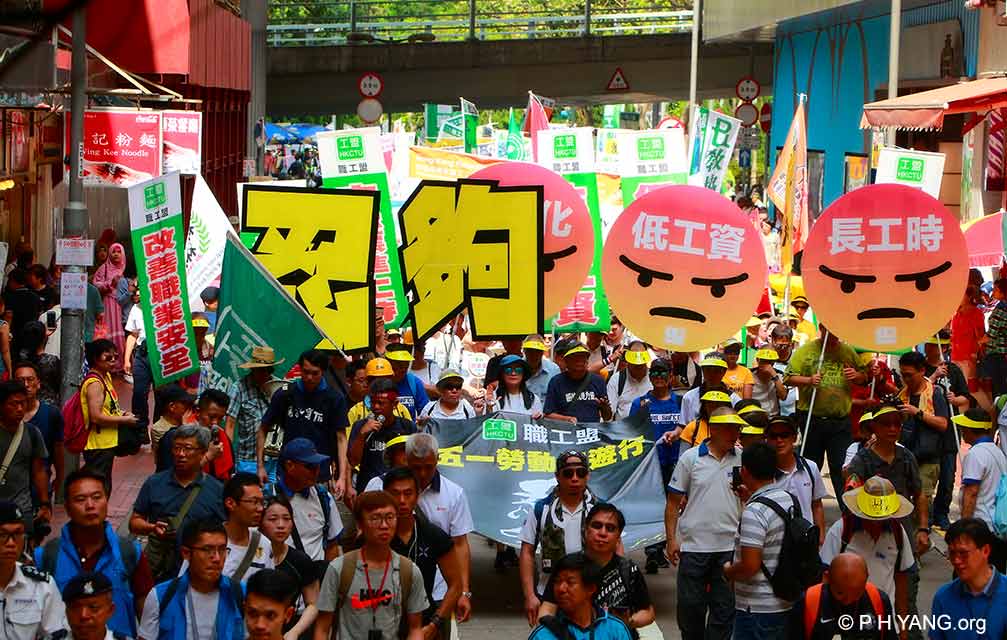Thousands of Hong Kong workers marched for labour rights on International Labour Day on Tuesday.
The pro-democracy Hong Kong Confederation of Trade Unions held a march calling for standard working hours and for outsourced workers to be paid a living wage. The organiser said 2,500 people attended the march from Causeway Bay’s Victoria Park to the government headquarters in Admiralty, while police estimated a turnout of 2,100 at its peak.

Protesters including bus drivers and cleaning workers from the Hoi Lai public housing estate, who went on strike earlier this year, joined the rally.
Some held signs saying: “Enough! Stand up!” The Confederation accused the government of overlooking the role played by long working hours in recent fatal industrial accidents and traffic accidents.
Carol Ng Man-yee, chair of the Confederation, said: “Over the last one or two months, these fatal industrial and traffic accidents were caused by long working hours.”

“Right now employees in Hong Kong are facing a miserable situation – they are working until they die, but even if they die they must keep working.”
“Why are they working until they die? Because they are overworked, then they get into accidents while at work and die… but they must… keep working because they do not bring home enough money.”
A bus driver criticised the maximum limit of 14 hours a day for bus drivers working “special shifts.”
“We want to see our families more, we don’t want to go home after they’re all asleep – and we don’t get enough rest,” a bus driver surnamed Pang told Ming Pao.
“I get up at five in the morning to leave for work, then work until I get home at 10pm – that’s the earliest,” he said.

Domestic worker rights
The Asian Migrants’ Coordinating Body also joined the march, calling on the government to include migrant domestic workers in the Statutory Minimum Wage, increase the minimum wage for migrant domestic workers to HK$5,500 a month, and regulate working hours to provide workers with 11 uninterrupted hours of rest.
Around 30 people from Socialist Action and migrant workers groups also marched to government headquarters from Central’s Chater Garden calling for an increase in the minimum wage for domestic workers and for an eight hour working day to be put into effect.

The Confederation’s pro-establishment counterpart, the Hong Kong Federation of Trade Unions, also marched from Southorn Playground to Admiralty on Tuesday morning. They submitted a petition to the government asking to abolish MPF pension offsetting and opposing the expansion of government outsourcing and the importation of labour.
The Federation said 5,000 attended their march, though police said 1,900 attended at its height.
They also called for 14 weeks of paid maternity leave and improvements to labour conditions by shortening duty hours.
Gov’t review
In response to the demonstrations, the government released a statement from a spokesperson saying that it is exchanging views with stakeholders on a preliminary idea on the abolishment of MPF offsetting.
The spokesperson added that the Minimum Wage Commission is conducting a new round of review on the Statutory Minimum Wage rate and will submit a report on its recommendation to the Chief Executive in Council by the end of October, and that the Labour Department is formulating sector-specific working hours guidelines for 11 designated sectors.
An interdepartmental working group is aiming to complete a review of options to enhance the employment rights and benefits of non-skilled employees for government service contractors before the third quarter of this year.
The government said in response to domestic workers’ demands that amended provisions on employment agencies that came into effect in February provide better protection against employment agency malpractices such as overcharging of commission and the unlicensed operation of agencies.
